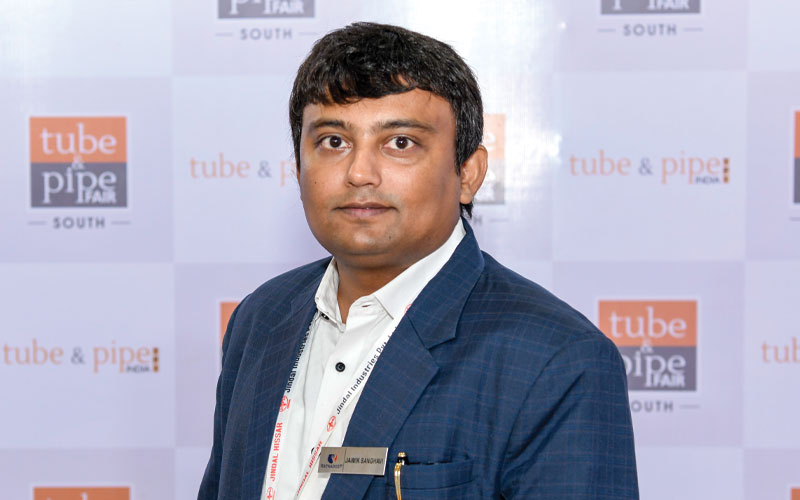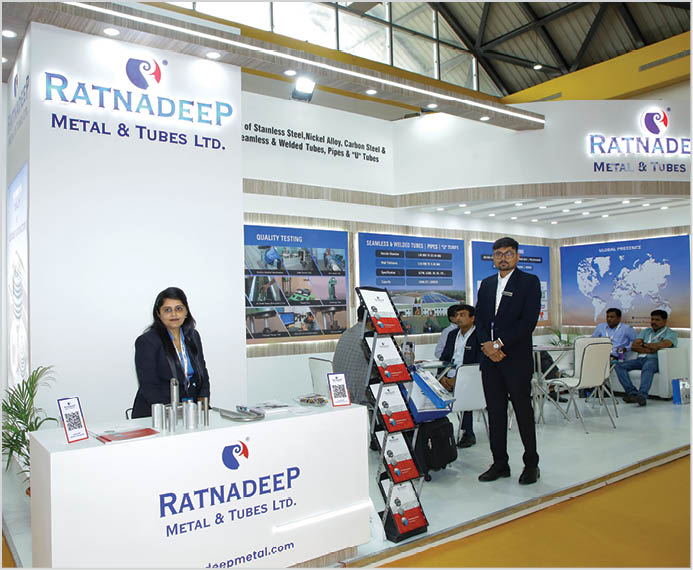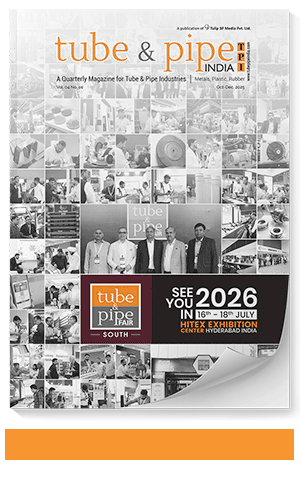Ratnadeep Metal & Tubes Limited, known for supplying high-quality products to crucial sectors such as oil & gas, nuclear and power plants, plans to double its manufacturing capacity for all its products in 2025. The company is also coming up with a hot finish plant next year to produce raw material in-house for seamless tubes. Mr. Jaimik Sanghavi, Director, Ratnadeep Metal & Tubes Limited, revealed this and much more, during an exclusive interview with Tube & Pipe India.

Tube & Pipe India: Kindly walk us through the illustrious business journey of Ratnadeep Metal & Tubes Private Limited.
Jaimik Sanghavi: Our journey started in 2004 by manufacturing tubes & pipes in stainless steel, carbon steel & alloy steel seamless & welded. We gradually increased our capacity, production and testing facilities, to cater to a wide range of industries and sectors. Today, we are a leading manufacturer and supplier of stainless, carbon & alloy steel to the tubes and pipes industry. We serve a variety of sectors, such as petrochemicals, chemical plants, fertilizer plants, power plants, nuclear plants, automotive, aerospace, etc. Each and every sector we work in is extremely crucial. Our tubes are used in very critical projects, a level where there’s no scope for failure. Owing to our high-quality products and time delivery, we have gradually and steadily earned goodwill and reputation in the industry.
TPI: What is the USP of Ratnadeep that gives it an edge over others?
JS: We are one of the top players in India, supplying our material to different clients. My father has been in this industry for the past 40 years.
In our industry, failure is not allowed. We have to maintain our performance at all levels, starting from manufacturing to delivery of products. Since the industries are upgrading to newer and innovative technologies, if we want to stay in the market, we also have to upgrade ourselves and remain aware of the current scenario.
We understand the criticality of the material we produce and supply to our clients. Due to our rich industry experience and top-notch quality products, we are way ahead of our competitors.
TPI: Kindly tell us about your product portfolio.
JS: We started manufacturing carbon steel seamless tubes in 2004. In the same year, we set up our production facility for welded stainless steel. In 2005, we started manufacturing stainless steel seamless. We now cater to the market of stainless steel, carbon steel, alloy steel & nickel alloys. We have a very wide range of applications. Our client does not have to go to different vendors. We are like a one-stop shop, having all products in-house.
TPI: In what industries are your products majorly used? What more industries or sectors are you currently eyeing or targeting?
JS: There is a huge requirement of tubes and pipes in India in a lot of segments. Having said that, 80 percent of our business comes from oil & gas refineries, petrochemicals and power plants. The rest 20 percent comes from the products supplied to fertilizer plants, automotive industries and the hydraulic sector. We also supply our products to aerospace industries. We supply instrumentation tubes to the Indian Space Research Organization (ISRO). We want to expand our presence in the aerospace and nuclear power industry because the quality requirement is higher in those sectors and the work is pretty good. We are also going to set up a hot finish plant next year to make raw material for our seamless tubes in-house.
TPI: Kindly share details about your market footprint.
JS: We have two products – stainless steel and carbon steel. We do 60 percent of stainless steel business in the domestic market and 40 percent in the export market. In carbon steel, we are having a ratio of 90:10, which means 90 percent of business is done in India and 10 percent outside the country. Outside India, Europe is a major client for stainless steel, along with the Middle East. We are also supplying carbon steel tubes and pipes to countries in the Middle East.
TPI: What is your take on the European Union’s Carbon Border Adjustment Mechanism? Are you prepared for CBAM as an exporter?
JS: We are prepared for CBAM, which will be introduced in 2026. We are aware of the CBAM regulations and have started giving our quarterly carbon emission reports to our clients, since our customers will have to pay tax based on our carbon emissions. We have installed 1.2 megawatt solar panels on our company roof. We believe in green energy and try to reduce our carbon emissions.
TPI: Please tell us about the challenges you face in smooth running of business operations.
JS: Challenges are always there in any industry. Due to the current geopolitical situation, to be precise, the Russia-Ukraine war, many projects in Europe have been canceled and the continent is also experiencing a slowdown. I think there will be challenges and a slowdown in the oil and gas sector also in future. Now the market is being driven through electric vehicles. Besides, there are other developing markets like hydrogen, which we can focus on.
Also Read: Global Seamless to Establish ‘Global 2’: New Stainless Steel Plant in Kolkata
TPI: What new regulation would you like the government to introduce for the ease of business?
JS: There are some policies regarding steel, which need the government’s attention. Besides, certain varieties of steels are not melted or produced in India. We think the government should understand the requirements of the steel industry and work on their production or melting in the country. This will reduce our dependence on imports for special steels, as well as make it easier for Indian companies to manufacture special grades like nickel alloy, which has good prospects as a future market.
TPI: What kind of production capacity are you eyeing in 2025?
JS: We are going for backward integration for our in-house raw material manufacturing. We are currently producing around 7,000-8,000 metric tons per annum. From next year onwards, we will double this capacity to 15,000 metric tons per annum for all our products.
TPI: What are the growth prospects of the Indian tube and pipe industry?

JS: We foresee huge growth in the Indian tube and pipe industry. The government is increasing investment in many sectors, such as oil & gas, fertilizers, power plants, and nuclear energy. We feel the future is very bright for the tube and pipe market in India.
TPI: Please share your experience at the second edition of Tube & Pipe Fair in Hyderabad?
JS: We are participating for the first time in the Tube & Pipe Fair and absolutely love this expo. It is also our first participation in an industry fair in the southern part of the country. We took part in the exhibition earlier in Delhi. Ratnadeep hopes to meet new clients and explore new markets down South. It’s amazing to meet a variety of people. We met a lot of suppliers and machine manufacturers here. It has been a great experience.










